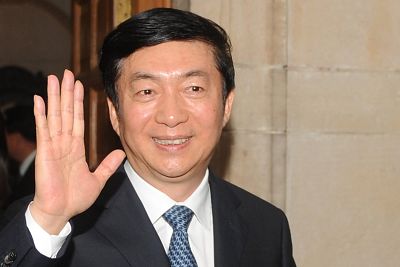State media reported Saturday that Wang Zhimin, the most senior mainland political official in the protest-riven territory, was being replaced.
China replaced its top official in Hong Kong Saturday following months of protests in the semi-autonomous territory, state media said.
Wang Zhimin, who was the most senior mainland political official stationed in Hong Kong, has been replaced as the director of the Liaison Office of the Central People's Government, according to the state-run China Global Television Network.
The office has come under criticism in both Hong Kong and China for misjudging the growing unrest.
Wang had held the position since September 2017, according to local reports.
Officials in Beijing have considered replacing Wang since at least November as a sign of their dissatisfaction with how the office has handled the crisis, according to Reuters.
NBC News has not verified the report.
Luo Huining, who is reported to be taking over the lead of the liaison office, previously served as secretary for Communist Party in the northern Chinese province of Shanxi.
Around 400 people were arrested during New Year's Day demonstrationsthat turned violent with people throwing Molotov cocktails and vandalizing banks and shops while police responded with pepper spray and tear gas.
The protests were triggered by a now-withdrawn extradition bill in June. The movement has since morphed to include calls for greater democratic freedoms and universal suffrage amid fears of China's increased control over the territory.
Hong Kong is a former British colony that became a special administrative region of China in 1997. Unlike those living in mainland China, the territory's seven million residents can freely surf the internet and participate in public protests.
But there is widespread fear that their rights are being eroded under Beijing's rule.
In November, President Donald Trump signed into law legislation backing the protestersby requiring the State Department to certify annually that Hong Kong retains enough autonomy to justify favorable U.S. trading terms that have helped it maintain its position as a world financial center. The law also threatens sanctions for human rights violations.
The liaison office expressed "extreme anger" toward the U.S. in response, and added that Hong Kong belongs to China and "the Chinese have the ability to deal with Hong Kong affairs."
At the same time, pro-democracy forces celebrated a landslide victory by sweeping the Hong Kong district council elections. However, district councils have little power and while the territory's Beijing backed leader Carrie Lam promised to "humbly listen" to the public's opinion, Foreign Minister Wang Yi warned that no matter the results, Hong Kong will remain a part of China.
Protesters have not relented.












